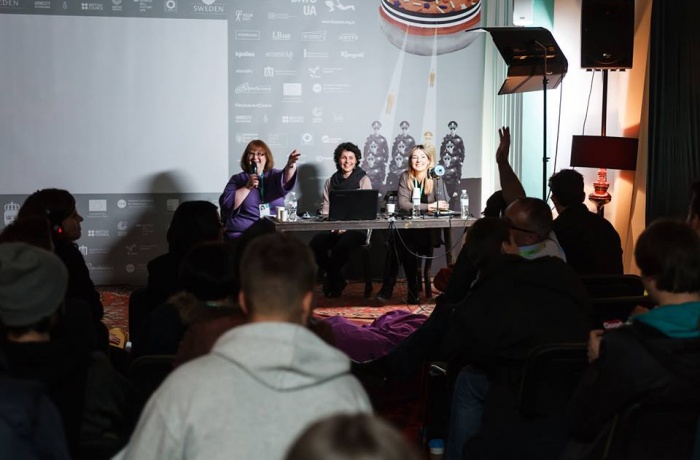
It’s hard to imagine the work of many leading film festivals without an industrial section. It is a parallel life where directors, producers, distributors and programmers negotiate about partnership, financial support, and, in fact, establish the trends of future film process. DOCU/PRO platform starts to work on Docudays UA this year.
Docudays UA programmers Gennady Kofman and Olga Birzul are talk, why Ukrainian documentaries need their own industrial section.
Gennadiy, let’s open the cards at once. This is not the first year for the festival team to discuss the idea of DOCU/PRO industrial platform. But first we should explain, what that is.
Along with competition and non-competition programs, intended for large audience, there usually are parallel sections at big international film festivals: content (film) market and so-called industrial section, where special accreditaion is available for professionals only. The locations here are full of life as well, perhaps even more than the rooms and halls of festival cinemas.
I think that these sections have appeared because of several factors. First of all, the number of documentary films that come out every year, has increased: according to some sources, it’s up to 10`000. And we didn’t even count short and student films. Imagine that a festival selector needs to watch at least these 10`000 films. According to my calculations, that person would have watch films 27 hours a day for the whole year. Mission impossible. That’s why certain beacons are needed, the mechanisms that help drive attention: what films are being made, when they will be ready. Another factor is limited sources. Almost every director and producer faces the same problem before realization of their creative idea: where to find money for their future film, how to get the necessary budget. Considering that most films in Europe are shot in co-production (united efforts and resources, creative and financial, of several countries), such platforms help find investors, partners, co-producers.
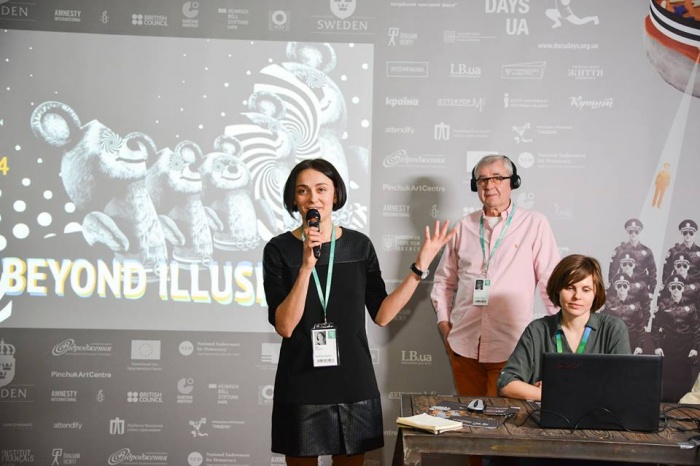
Anna Akulevych and Oleg Fialko present their project "Dzhamala.UA" on the pitching of "The Guadian goes Ukraine"
And at last, the film is shot to be seen, that’s why such sections can help find channels of bringing films to the viewer, and with luck, even find an agent to handle the sales for television and cinema distribution. Besides that, directors and producers will be able to present their film on very different stages - from project to finished film - to festival selectors, buyers at TV companies, distributors and other professionals. Public presentations (so-called pitchings) take place here, as well as private meetings, conferences on market trends and opportunities for film cooperation in one or another country.
We can forget about modesty here and say that Docudays UA is a perfect place for such section.
Of course. Every professional arriving at one or another film festival is interested, what is shot here, and whether they can find partners for a joint project. Besides that, there is nothing shameful, if the festival thinks it is their task to aggressively promote films and projects of their country.
Why do you think it is important to open DOCU/PRO right now? Is Ukrainian documentary process ready for the launch?
I would say that the glass is half full. We’ve been witnessing a documentary boom in our country in the recent years. We can tell it even from example of our festival, Docudays UA. Last year we got 99 applications from authors of films, shot in Ukraine or in cooperation with Ukraine. This year I counted 106 such films. Our old dream has finally come true - last year we founded a national competition on Docudays UA. This is the second year for us to publish a Ukrainian documentary catalogue with support of the National Film Agency, which is presented at the biggest documentary film festivals. This catalogue contains Docudays UA recommendations for selectors at documentary festivals, distributors and other representatives of the film industry. The catalogue also has information on projects in production. But the other half of the glass is still empty. The law on film support is still under the presidential veto. That means that the rebait system is still not working (partial compensation of producer’s expenses, that is functioning in many European countries and invites foreign film projects with their investments to the country). Creation of regional commissions remains only an idea. Ukrainian State Film Agency is still the only source of financing in our country. Though the state funding of films is growing every year, finding means for project development is still an impossible task. Because the stage when director does the reserch, the archive work, the film project development, creates a trailer, can take up to four-five years. Today in our country all of this gets done only thanks to the authors’ enthusiasm. Not to talk about the fact, that most documentalists simply don’t have the money to go even to the neighbouring countries - to Poland, to the project markets.
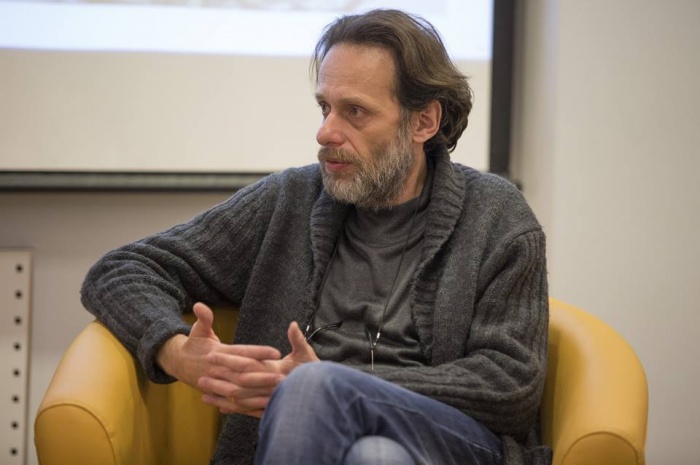
Gennady Kofman
All this time we’ve been trying to enchant Ukrainian audience with documentary films, and it seems that we have created an illusion that it’s easier to make a documentary film, than a non-fiction film. It seems to me, that this mistake partly exists, because some Ukrainian directors don’t see the difference between TV programs and non-fiction films. Do you have an explanation, why it is rumoured that a non-fiction film is cheaper to make?
The way television functions is absolutely different. There are components necessary for communication with the audience, like a host (preferrably a local inexpensive celebrity, or even better - the author himself), a number of experts (the more the better), and, of course, in between all these components - uniterrupted voiceover. The whole thing should also have non-stop background music. A 30-second pause in such product is a technical fault. The picture here is not even a secondary thing - it’s almost unnecessary. Why do you need it anyway, if the majority watches television with the back of their heads.
Of course making such a “documentary” isn’t that difficult. Two or three shooting sessions for interviews, a few days of editing. Such project wonderfully formats not only the viewers’ conscience and their tastes, but the way the authors think. They can’t shoot anything else after a year of such practice. If a person has never tried not only to follow development of the present-day documentary process, but at least to watch something different (they probably don’t even know, that there were films made in our country that are now considered world film classics) - there is nothing to talk about here. It is almost impossible to prove to some television manager in charge of production of such content, that there are films that took 5-6 years of the author’s life to develop. There is also another type of managers. I hope, they are our potential partners.
Other instruments have become available, too. Anyone can shoot a video on their phone and edit it on their laptop (or even on the phone as well). That’s why making a documentary film seems easy. There is no universal criterium though, that defines the cost of film. It all depends on particular project. But a serious film usually demands considerable amount of money. I can tell from my producing practice: despite all the efforts to optimize the budget, an average cost of European documentary film (or a film shot in cooperation with Europeans) today varies between 150-250 thousand euro. Budgets in the USA can reach 500 thousand dollars. The cost of film doesn’t only include expenses for technical equipment, helicopters and expeditions. There is also cost of unique archive materials and, finally, cost of intellectual work.
One time we were developing a new film with europeans. During the negotiations with my partners I said that according to the rules of our Cabinet of Ministers, we can pay for the scenario of a feature documentary film around 600 euros. My partners were silent for a day. After that, they tried to explain very delicately, that nobody understands… it can’t be.. that creative work is paid so miserably. Unfortunately, talking about adequate worth of creative work is still considered obscene in our country.
We are planning several projects within DOCU/PRO. We will tell more about each of them on our festival website. But recently I came across certain distrust among Ukrainian documentalists towards international laboratories for young directors. They say, they are expensive and inefficient. Why do you think that is?
The word “pitching” has assumed an ironic tone among professionals lately. It is true that educational programs for documentalists have become quite common today. They teach, how to prepair a project for presentation, tell how the international market functions. The cost of participation in such a laboratorium is considerable, for example, from 800 to 5`000 euro. I should mention that participants from Ukraine can sometimes get a grant from organizers to cover the expenses for transportation and housing, during a week or even more, in the country where the training takes place. Such programs usually end up with a pitching - a public project presentation. It is often that random people come there as experts (let’s call them the jury), but they aren’t going to invest anything into presented projects. Even if real market players come there, there is a lot of conditions that make it hard for our documentalists to find an investor at such pitching. First of all, you should have a co-producer in a country presented by the investor, because investors work only with companies-residents of their countries. Or at least with residents of the EU. There should be at least 30% of confirmed financing at the pitching. Sometimes the key factor is, whether or not the TV participates in co-production in the country presented by the author.
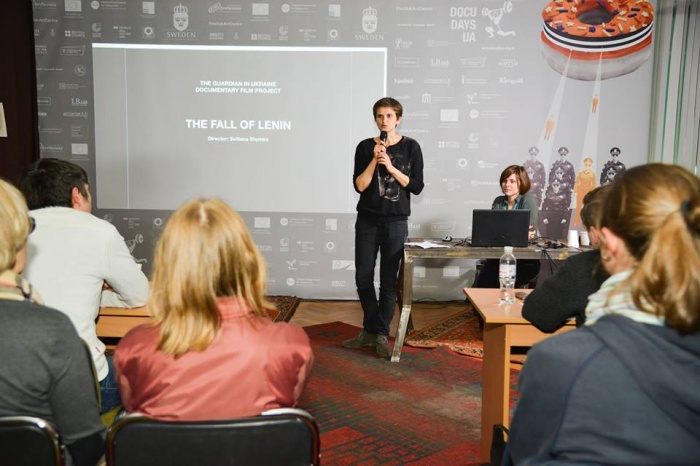
Svitlana Shymko presents her project "Lenin-Fall" during the pitching of "The Guadian goes Ukraine"
Another decisive factor is, if the producer from the other country is interested: it’s very important to offer not only financial, but also creative participation in joint production of a film. If all the vacancies are taken and you only need money, it will hardly interest potential co-producers. And at last, because the director’s name says nothing to the investor, even if the project is interesting, the most optimistic thing you can hear is: it would be good to see the raw cut. But for that you need to manage to shoot somehow. But how can you do that, if there is no money? It becomes clear that such cruises become just a waste of time. The most you can get from them is building up some contacts, getting to know more people. But not everyone can afford an investment in such luxury. At the same time, I know some positive examples, when such programs helped to plan and release a successful strategy of project promotion, from finding budget to festivals and selling rights for demonstration to different TV companies.
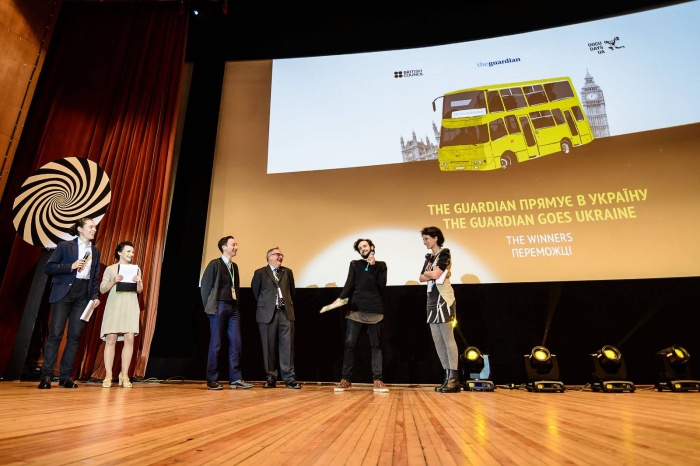
The closing ceremony of Docudays UA-2016
We are working on our pilot DOCU/PRO this year, but we obviously have big plans for future. Tell us, how is the platform going to develop, what lacunes of the film industry does it aim to fill?
I think that the main focus should be on providing support, especially financial, in development of film projects of young documentalists, on helping them find partners for the first step in realization of their film. It is important to us that the platform is efficient, that it has a prize fund. We would really want TV channels’ representatives to become active participants of the industrial platform. The time should come, when television will become full partner in creation of good Ukrainian documentary films. I also hope that every year our platform will involve more professionals from other countries, interested in co-production with Ukraine.
But you can also feel that the wind has changed in Ukrainian film industry lately. What do you think has changed for better and for worse?
The way the market functions has changed. From a fact of art cinema is turning into a product. Considering that the capacity of market is a lot smaller than the amount of product, it’s geting harder to find budget for a film and break even. Unlike other products, every film is a living organism, and the rules of it’s life are developed anew each time. Of course the questions of marketing, budget and communication with potential partners come first.
There are two radical positions. Some say that producers can’t be trusted, that they are all scoundrels who profit from work of the poor directors. But I think that the most important thing for director is to find their producer, who will protect them from all this mess and leave some space for cinema, creative struggle and work with senses. Because the moment when director becomes producer himself, the cinema as art will loose him forever.
You are the most experienced festival traveller among us. What international industrial platforms can be interesting for Ukrainian documentalists?
Personal experience, building up contacts can change nothing, obviously. It is better to visit as many platforms as possible, widen your social circle and make your own conclusions. But I think that Poland (Krakow and Warsaw film festivals), Czech Republic (Jihlava documentary film festival and One World in Prague), Germany (DOK Leipzig festival) are the most friendly to our experience countries, it is easier to find common aesthetic principles and mutual understanding there. But I don’t think you should take a bag for money with you. You will probably not use it. The distance between project presentation and signing the contract takes quite some time.